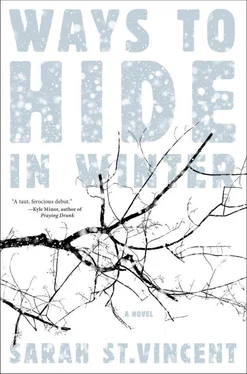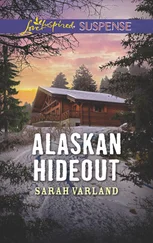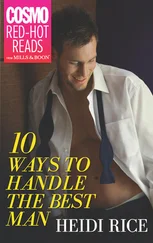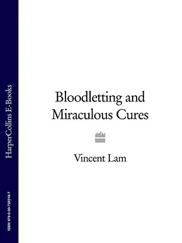I failed to realize that the present had brought its own problems, ones our mutual retreat into the depths of the woods wouldn’t fix.
“Would you look at that!” he exclaimed one morning. “‘Summering for St. Petersburg,’ five letters. It’s a dacha! I didn’t know Americans knew any Russian words besides vodka.”
“We don’t,” I said, and he slid his chair over next to mine, holding the book over my knees to show me. His shoulder brushed against mine.
“See?” he said, pointing. But I was looking up, watching a figure in a camouflage coat cut across the picnic grounds, treading slowly, a large gun I had never seen before dangling from one arm. It was Jerry.
“That’s funny,” I said, my eyes on the long black barrel, the powerful-looking scope. It was no longer rifle season.
Realizing that I wasn’t talking about the crossword, the stranger looked up, too. “What?”
The figure had disappeared down the trail, the gun barrel leading the way before it. Before I could blink, it had vanished into the trees.
“Nothing,” I said.
—
That afternoon, my grandmother collapsed facedown in her coffee while playing cards at the Friends of Eagles. The phone in the store still wasn’t working, but somebody must have called the park rangers, because one of them came to find me. He took off his hat as he stepped through the door—something nobody ever did, except for the oldest hunters—and cleared his throat, looking uneasy. I put down the book I was reading, and we looked at each other for a long moment. He offered me a ride, but I shook my head.
The ambulance had taken her to the hospital in Carlisle. I sat in the waiting room on the strange pastel-colored chairs, my gaze periodically drifting to a TV without sound, trying to stop myself from imagining the worst. As the hours slid by, I tried to call my parents from a pay phone outside, but there was no answer.
The nurse, a squat blond woman bearing a clipboard, called my name just as I was opening a soggy-looking ham-and-cheese sandwich I’d bought from a vending machine. I hurried after her.
My grandmother was stretched on the bed with her eyes closed, a shining plastic tube leading from her nose to a beige machine. There were red lines around her mouth, where something—a mask, I guessed—had recently been pressed. Her brows were furrowed, as if, even in her sleep, she were skeptical of everything around her.
I sat next to her and waited, knitting my fingers in my lap. A different nurse padded in to adjust the pillow and check a small device that was attached to my grandmother’s fingertip. While I watched, she smiled at me briefly, then padded out.
Another hour passed. When I had been in the hospital during the long months after the accident, I had tried to stave off boredom by watching animal shows on the television mounted on the wall, or, later, by playing private games, looking out the window and trying to think of as many words as I could that rhymed with a particular sound, my lips moving silently. At other times, I simply sat, letting my mind wander into dark crannies of the imagination I hadn’t known existed. Sometimes, when I looked in the mirror, I was surprised to find that I was still who I had been before, the thin twenty-two-year-old. It was childish, I knew, to be so absorbed in my own daydreams. Yet, gazing out over the hospital’s rolling lawn, I didn’t really care if it was childish or not. The pills made it impossible to concentrate on anything important, anyway. There seemed to be no reason not to drift.
It was only later that I was sad, although I couldn’t have said exactly what I was sad about. For whatever reason, it seemed to be worst when I thought about my brother, riding around in an armored car in some faraway wasteland. I pictured his Humvee from above, a square thing with a gun turret, like some bizarre kind of beetle making tracks in the sand. It seemed like such a useless, dangerous thing for someone as alive and human and real as my brother to be doing. I would cry then, without really knowing why. We had never exactly been close, but I couldn’t bear the thought that he was out there, so vulnerable and exposed. Somehow, it seemed to strengthen the pain that had coiled itself so tightly around my bones, to make it burrow deeper.
Sitting by my grandmother’s reclining figure, I was suddenly overcome by a regret I couldn’t explain. She was, I thought, probably the person who cared most for me in the world, even if it was sometimes difficult to tell how she really felt about anything.
Just before visiting hours were about to end, she woke with a start, grasping the sheets.
“Grandma?” I touched her arm.
She opened her mouth, making a dry sound and looking around as if she didn’t know where she was. The nurse had left a cup of water on the bedside table, and I raised it to her lips. She sucked on the straw, looking at me, gradually seeming to recover herself. As she sipped, she narrowed her eyes.
“You!” she said finally, spitting water onto the blanket. I hurried into the bathroom and returned with a paper towel, reaching out to wipe her chin. She turned her head away with a grunt.
“Yes, it’s me. Here, let me—”
“Why are you here?” Her fingers clenching the blanket, she regarded me with a mixture of anger and embarrassment. I stepped back with a sigh.
“You got sick. Of course I’m here.”
“Pah!”
I crossed the room as calmly as I could and threw the paper towel away. “You probably shouldn’t talk so much right away. You’ll get tired.”
She made a face at me and turned her gaze to the window, where the two of us were reflected. Slowly, she lifted a hand and looked at it. A needle had been inserted into a vein on the back of it, held in place with white tape.
A minute passed. The sound of footsteps reached us from the hall, approaching and then fading. Far away, a door opened and closed.
“Are you going to take me home?” she asked then, in a voice that was more subdued.
“Yes, although I can’t until the doctor decides you’re ready. It might be a while.”
Her eyes swiveled up to meet mine.
“I don’t think it’s going to be tonight,” I said. “It’s already late. How are you feeling?”
She gestured dismissively. “Old.”
A light was pulsing on the machine next to her, in time with some unknowable part of the forces that were keeping her alive. The thought crawled into my mind that there might be something that interested me somewhere in the vicinity—a box of samples, maybe, or even a prescription pad lying around. With a grimace, I pushed the idea out of my mind. I was here for my grandmother, not myself.
“Do you want to go back to sleep?” I said. “I can go.”
“I don’t care. You do what you want.”
I reached out and fixed her pillow. She let me do it, still looking at the window.
The light on the machine continued its pulsing. Drops of some unknown substance trickled from an IV bag into the needle on the back of her hand.
“I killed him, you know,” she mumbled finally.
“What?” I started, looking down at her. “Killed who?”
She coughed, irritated. “Him. You know.” An edge of defiance crept into her tone.
“Who? Grandpa?”
“Yes.”
I stared at her, baffled. “No, you didn’t. He had a heart attack on Thanksgiving, after dinner. Dad found him. Don’t you remember?”
She glanced around her, confused. “Well, I wanted to kill him.”
I sat back, rubbing my forehead, wondering if there could possibly be a good response to this. “That’s not the same thing,” I said eventually. “We’ve all had thoughts like that at times.”
“You haven’t.”
I looked at her. For a disturbing moment, I thought she was alluding to the rumors, challenging me. Then, with an even bigger jolt, I realized she was sincere. It had never in my life occurred to me that she might look up to me, and I dismissed the thought immediately. It was simply too strange.
Читать дальше












